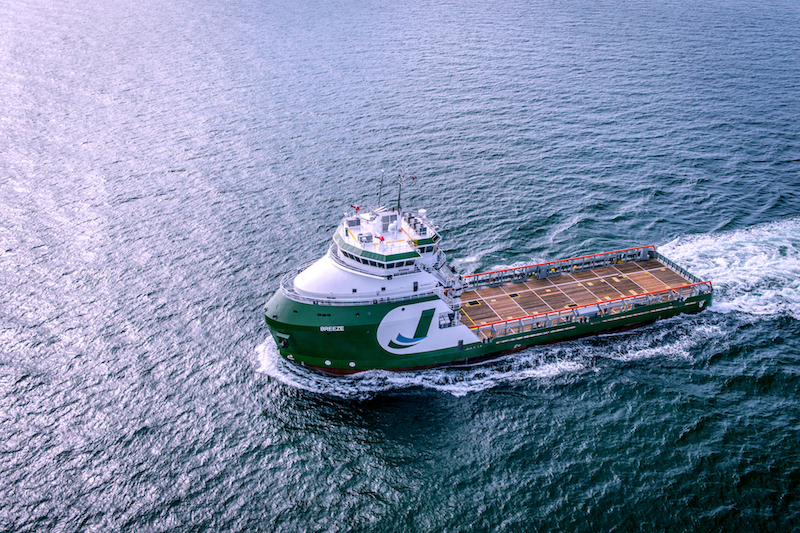Like other workboat sectors, the offshore service vessel industry is being affected by the coronavirus pandemic. At the same time, the offshore industry is getting hit with a double whammy — plunging oil prices. The price of West Texas Intermediate, the U.S. benchmark crude oil, hit its lowest level since 2004 on Wednesday.
WTI crude closed at $22.59 on Friday.
Matthew Rigdon of Jackson Offshore Operators, said the limited supply of coronavirus testing apparatus is creating an especially untenable situation in ensuring vessels are adequately crewed. "The biggest concern for us as a company right now is that everything you're hearing on the coronavirus is that if you're exposed to it, you need to be quarantined for 14 days," said Rigdon, executive vice president and COO of the Houston-based OSV operator. "So, if a guy shows up on a boat and has a cough, what do you do? Do you quarantine him?"
During Tidewater's March 3 conference call, Quintin V. Kneen, president and CEO of the offshore service vessel operator, commented on the potential impact from the coronavirus. "We have been proactively engaged with the international health and travel consultants on the outbreak. We have obtained related virus precautions to help our employees avoid any potential exposure. We continue to monitor the updates on this outbreak. Due to the nature of our business, the safety and well-being of our employees has always been our highest priority and we have well established protocols on safety communications. Our current concern is having our crews transit through high risk locations. We continue to monitor countries identified as high risk and we instructed our travel companies to avoid any crew movements through these higher-risk countries."
More fallout from the coronavirus came last week when the Offshore Technology Conference (OTC) postponed its annual conference in Houston from May 4–7 to the third quarter of 2020. OTC said they were working to confirm dates in August or September. OTC has been held annually since 1969.
On Friday, in an effort to help the domestic maritime industry, the Offshore Marine Service Association (OMSA) sent a letter to Congress requesting that the maritime industry is included in the COVID-19 stimulus legislation, the “Coronavirus Aid, Relief, and Economic Security Act” (CARES Act).
On Monday, OMSA asked for an extension for expiring Coast Guard certificates. OMSA sent a letter to Rear Adm. Richard Timme, assistant commandant for prevention policy, requesting that all mariner medical or vessel credentials expiring in the next 60 days be extended beyond May 17 if the renewal required a class, examination, or inspection. OMSA said it "believes this is a common-sense step necessary to enact social distancing and flatten the curve."
On Tuesday, the Eighth District Officer in Charge, Marine Inspection (OCMI) of the Outer Continental Shelf (OCS) issued Marine Safety Information Bulletin 20-01, “Novel Coronavirus,” to alert offshore operators of protocols and requirements regarding novel coronavirus.
An outbreak of respiratory illness caused by a novel coronavirus (COVID-19) may affect offshore workers. While not specifically tailored to the OCS, the Coast Guard has published several Marine Safety Information Bulletins (MSIB) related to COVID-19 that provide relevant guidance.
Many companies have already initiated protocols for reducing exposure to the virus for their personnel and those protocols should stay active for the foreseeable future. While not specifically tailored to offshore facilities, guidelines recently published by the Centers for Disease Control and Prevention (CDC) provide guidance for further protocols to consider.
Operators shall develop and be prepared to execute plans to evacuate offshore personnel exhibiting COVID-19 symptoms, and have them tested.
Additionally, operators are reminded to report the illness (as defined in 42 CFR 71.1) or death to their respective Coast Guard Sector Command Center as outlined in the Marine Casualty Reporting MSIB 19-01 dated 28Jan2019. This will ensure continued tracking and awareness of the virus. Questions concerning this bulletin should be sent to ocscorrespondence@uscg.mil.
Check out the latest on the coronavirus pandemic and the workboat industry here.
Editor's note: Correspondent Jim Redden contributed to this report.




